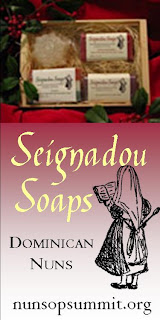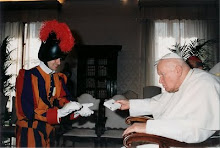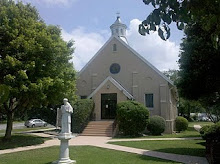When you’re sitting down for that
wonderful feast on Thursday, here are 6 interesting Catholic Thanksgiving Facts
you can share with your family. Print them out and read them aloud over some
pumpkin (or pecan) pie!
The history books will tell you that
the first Thanksgiving was celebrated by the Protestant pilgrims of
Massachusetts in 1621. Not so. There was the Catholic Thanksgiving of 1565 in
Florida and another Catholic Thanksgiving of 1589 in Texas.
- The first American Thanksgiving was actually celebrated on September 8 (feast of the birth of the Blessed Virgin) in 1565 in St. Augustine, Florida. The Native Americans and Spanish settlers held a feast and the Holy Mass was offered. This was 56 years before the Puritan pilgrims of Massachusetts.Don Pedro Menendez came ashore amid the sounding of trumpets, artillery salutes and the firing of cannons to claim the land for King Philip II and Spain. The ship chaplain Fr. Francisco Lopez de Mendoza Grajales chanted the Te Deum and presented a crucifix that Menendez ceremoniously kissed. Then the 500 soldiers, 200 sailors and 100 families and artisans, along with the Timucuan Indians celebrated the Holy Sacrifice of the Mass in gratitude to God.
- The second American Thanksgiving happened on April 30, 1598, when Spanish explorer Don Juan de Oñate requested the friars to say a Mass of Thanksgiving, after which he formally proclaimed “La Toma”, claiming the land north of the Rio Grande for the King of Spain. The men feasted on duck, goose, and fish from the river. The actors among them dressed and presented a play. All this took place twenty-three years before the Pilgrims set sail from England on the Mayflower.
- The Puritan pilgrims were violently anti-Catholic. They
left England because they thought that the Church of England was too
Catholic. These Puritans were strict Calvinists. The pilgrims
also opposed celebrating Christmas, dancing, musical instruments in
church, and even hymns as papistical.
- Squanto, the beloved hero of Thanksgiving at Plymouth Rock, was Catholic! (Here’s my full article on the Catholicism of Squanto.) Squanto had been enslaved by the English but he was freed by Spanish Franciscans. Squanto thus received baptism and became a Catholic. So it was a baptized Catholic Native American who orchestrated what became known as Thanksgiving.
- So while Thanksgiving may celebrate the Calvinist Separatists who fled England, Catholics might remember the same unjust laws that granted the crown of martyrdom to Thomas More, John Fisher, Edmund Campion, et al. are the same injustices that led the Pilgrims to Plymouth.
- And let everyone remember that “Thanksgiving” in Greek is Eucharistia. Thus, the Body and Blood of Christ is the true “Thanksgiving Meal”.
And don’t forget to raise your wine
glass and recite the wonderful limerick of Hilaire Belloc:
“Wherever
the Catholic sun doth shine,
There’s always laughter and good red wine.
At least I’ve always found it so.
Benedicamus Domino!”
There’s always laughter and good red wine.
At least I’ve always found it so.
Benedicamus Domino!”
―
Hilaire Belloc
-from an article by Taylor Marshall
You can leave a comment by clicking here.
Share this with your Puritan friends
on Facebook (do Puritans prohibit Facebook?). If you’d like to receive my
theology updates and get one of my books for free, join our 11,000 subscribers
by signing up here!












